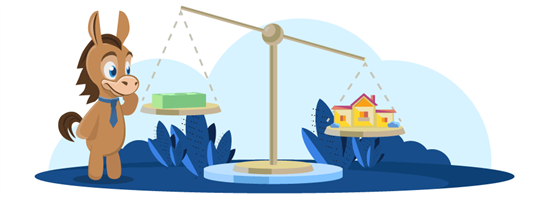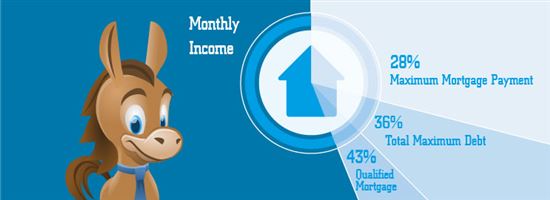How Much House Can I Afford? Smart Rule of Thumb
A simple estimate is to spend 28% of your monthly income on housing payments. But is that ideal? Learn how to better calculate how much house you can really afford.
 |
| © CreditDonkey |
Buying a house involves one of the toughest equations you'll ever solve - how much can you truly afford? We'll help you do the math.
Here's what no one helping you buy a house will tell you: Everyone is using a different calculator. The realtors, the mortgage lender, and you - the buyer - all have a different calculator when it comes to figuring out how much you can truly afford.
The realtors and lender want your business; they want to know whether you can afford a decent down payment to get the sale agreement going, but you need to think about what happens after closing day. Only you know how much you can truly afford.
If you miscalculate how much you can afford and struggle with your monthly payments, you'll end up house poor, challenged with covering your other debts, and you may risk losing your home.
Here's how to do the math so that this doesn't happen to you.
 |
Buying a home is an exciting time. As you sit down with your loan officer and hear how much house you can afford, it's easy to start dreaming. Loan officers often tell you the total dollar amount of what you can afford. Hearing words like "you qualify for a $400,000 mortgage" is exciting. This large number can make you dream big. Before you set out to find your dream home, though, you should think realistically.
This starts with knowing the right questions to ask. "Don't ask a lender, 'How much home can I afford?' because only you know that answer," advises Dan Green, a former top-producing loan officer and current founder of Growella, a mortgage news website. "Ask instead: 'How does this payment translate into a purchase price?'"
The truth is banks tell you the maximum amount you qualify to receive. This does not mean it is what you can afford. Rather than focusing on the total dollar amount, look at monthly totals. Break the intended mortgage down into real payments. Then compare that amount to your monthly income. This will help you determine how much house you can afford.
Unlike any rent payments you're making now, your housing costs will include not only the monthly mortgage payment but also mortgage insurance (if you don't put down at least 20% of the house price), homeowner's insurance, property taxes, and all utilities. Some condos or neighborhoods also have monthly or annual homeowner's association ("HOA") fees. Everything needs to be part of your calculations.
At CreditDonkey, we encourage you to sit down and think of all aspects of the mortgage payment. There is more to it than the principal and interest. Owning a home is a large responsibility that comes with hefty costs.
There is a Difference Between Affordability and Eligibility
 |
| © CreditDonkey |
Lenders have various ways to determine how much you can afford. They often rely on one of several rules of thumb to calculate your maximum loan amount. However, when banks determine what you can afford, they use your gross monthly income. This is not a realistic number to use.
For example, let's say you make $60,000 per year. The bank will divide that number by 12 to come up with your gross monthly income. On paper, this means you make $5,000 per month. But expenses such as taxes, health insurance, and retirement savings will reduce this number. If you take home 80% of your gross income, this leaves you with $4,000. That $1,000 difference could drastically affect your ability to afford a mortgage.
The Traditional Home Affordability Rules Used
 |
| © CreditDonkey |
There are many different theories lenders use to determine how much house you can afford. They can result in many different amounts that you can supposedly afford. Here are three of the most common:
- 43% Qualified Mortgage Rule: This rule helps prevent lenders from offering loans borrowers cannot afford. Lenders use the following calculation:
Gross monthly income x 0.43 = Maximum monthly debts
Maximum monthly debts - Monthly non-mortgage debts = Maximum monthly mortgage paymentReal life example with gross monthly income of $5,000 and monthly non-mortgage debts of $450 (credit card minimum payments and installment loans):
$5,000 x 0.43 = $2,150
$2,150 - $450 = $1,700 maximum total monthly mortgage payment (including principal, interest, taxes, and insurance) - 28% Housing Payment Rule: This rule focuses strictly on the mortgage payment. Lenders keep the payment at 28% of your gross monthly income. The calculation is as follows:
Gross monthly income x 0.28 = Maximum monthly mortgage payment
Real life example with gross monthly income of $5,000:
$5,000 x 0.28 = $1,400 maximum total monthly mortgage payment
- 36% Total Debt Rule: This rule focuses on your total debt, maximizing it at 36% of your gross monthly income. Lenders use the following calculation to determine your affordability:
Gross monthly income x 0.36 = Maximum total monthly debts, including the mortgage payment
Maximum total monthly debts - Monthly non-mortgage debts = Maximum monthly mortgage paymentReal life example with gross monthly income of $5,000 and monthly non-mortgage debt of $450:
$5,000 x 0.36 = $1,800
$1,800 - $450 = $1,350 maximum total monthly mortgage payment
Want to know which rule works the best? We discuss our top choice below.
Look at a Real Number
 |
Regardless of the rule your chosen lender uses, you should still look at the numbers as they pertain to you. There is a major difference between looking at numbers on paper and making them work in real life. Start by comparing your current housing payment to the intended mortgage payment. Is there a large increase? Can you handle this type of payment shock?
Of course, this will only work if you currently pay rent. If you still live with your parents or somehow live rent free, a mortgage will be a large adjustment for you.
There is no shame in letting a lender know you don't want the maximum mortgage amount you qualify to receive. After all, it's your mortgage and your home. Make sure you feel that you can truly afford it because it works for you - not because a mortgage lender says you can afford it.
The Real Cost of Owning a Home
 |
Mortgage lenders tend to strictly look at the amount involved in paying the mortgage. They include the following expenses when assessing your ability to pay:
- Principal
- Mortgage interest
- Real estate taxes
- Homeowner's insurance
- Mortgage insurance
- Homeowner's association dues
There is much more involved when you own a home, though. For instance, mortgage lenders do not consider the maintenance and repairs involved in owning a home. You also have utility payments, yard maintenance, furnishing, and decorating expenses. Don't forget homeowner's insurance premiums and real estate taxes typically increase over time as well. Some insurers, such as Lemonade Insurance, offer low base rates for homeowner's insurance and increase prices if you choose to add extra coverage for individual items.
If you currently rent, you may pay for utilities and even for minor repairs. However, when you move from a one-bedroom apartment to a larger home, the expenses increase accordingly. It is a good idea to ask the current owner how much they spend on utilities to help you budget.
It is impossible to predict the exact amount you need for maintenance and repairs. Anticipate the cost of annual maintenance and repairs to total at least 1% of the value of your home. On a $300,000 home, this means $3,000. This can help cover repair/replacement of your HVAC systems, electrical systems, roof, and appliances as needed. This is not to say you will spend $3,000 every year. Some years you may spend more and others you may spend less. Regardless, you should be able to save enough money to cover those expenses should you need them.
Don't forget, you also need to pay daily living expenses. Things like groceries, gas, entertainment, and traveling are not a part of your total debts. Having a predetermined number in mind can help you determine how much you can afford. You should include this amount in your monthly debts to help you see the real picture.
Consider Your Lifestyle
 |
Don't overlook your current lifestyle when you determine how much house you can afford. Will you still have the same lifestyle when you purchase a home? An easy way to figure this out is to look at the last few months of your monthly spending. Where does your money go? Look for things like:
- Coffee shop stops
- Fast food trips
- Entertainment (movies, bars, etc.)
- Shopping
- Haircuts/style
- Visits to the nail salon
These costs add up. Even visiting the local coffee shop a few times a week can cost as much as $60-$100 per month.
You need to take a long, hard look at how you live your life now and if you need to continue living that way. There are probably opportunities to cut down on your spending, and you should. But you shouldn't try to stretch and buy a home that you can barely afford even if you cut back on your daily coffees.
Look at Your Long-Term Goals
 |
Your long-term goals also play a role in how much house you can afford. Lenders usually look for 3 years of consistency regarding your financial situation. They need to verify that any income you receive will continue for the near future. For example, if you receive child support, you must prove you are likely to receive it for the next 3 years. What happens beyond those 3 years, though? This is what you need to figure out.
Do you have a 2-income family right now? Will it stay that way? If you plan to start a family, you may consider having one parent stay home. How will that affect your ability to afford your monthly obligations? Consider using one income to qualify for the mortgage to help you prepare for the future.
If you have other long-term goals, such as going back to school or starting your own business, you need to consider them too. If you anticipate your income changing in any way, you need to plan for the worst. When you look at how much house you can afford, use the worst-case scenario regarding your income. This way you can make sure you don't bite off more than you can chew.
Emergency Fund
 |
Even though you are about to take on the largest debt of your life, you still have to be able to save. We already talked about the need to save at least 1% of the value of your home per year for housing repairs. However, you also need to save for other emergencies and retirement. At the very least, you should have 3-6 months of monthly expenses saved. This includes your total housing payment and any other monthly obligations. If your total monthly expenses, including debts, equal $2,000, this means at a minimum you need $6,000 saved. This helps protect you from losing your home, should your income suddenly stop.
When you figure out how much house you can afford, you should figure in a fixed amount to save each month. The amount will vary based on what you can afford. However, you need to make it a part of your monthly bills.
What Can You Really Afford?
 |
Bottom line, you want to know what you can afford. At CreditDonkey, we feel the 28% rule works best as a starting point. Working with basic numbers, you can determine an estimate of what you can afford. In our $60,000 per year example, you can afford a $1,400 monthly mortgage payment. This includes your principal, interest, real estate taxes, homeowner's insurance, and mortgage insurance. But if you have homeowner's association dues or other debts you're trying to pay off, you should factor those in too.
Working backwards, you can narrow down the amount you can borrow. For example:
- Property taxes on a potential home = $5,000/12 months = $417 per month
- Annual homeowner's insurance = $900/12 months = $75 per month
Looking back at our 28% mortgage payment equation, you have the following:
- Gross monthly income x 0.28 = Total mortgage payment
- $5,000 x 0.28 = $1,400
Total mortgage payment - property taxes - homeowner's insurance = Maximum principal, interest, and mortgage insurance payment:
- $1,400 - $417 - $75 = $908 (principal, interest, taxes, and insurance)
That leaves you with $908 for a mortgage payment. This means a total mortgage of around $195,000. You can add to this figure the amount of money you can put down on the home. The total gives you the purchase price you can target for your home purchase.
Keep in mind that 20% is the ideal down payment. This helps you avoid paying Private Mortgage Insurance. On a $200,000 home, you should put $40,000 down. If you are unable to put 20% down, you will need to take a lower mortgage in order to fit the PMI into your 28%.
Loan officers don't mean for you to take the amount literally. You should only accept what you can comfortably afford. If you aren't sure what that amount is, test yourself. Take the amount your housing expenses will increase out of your paychecks. In this example, $1,400 will be your new monthly housing expenses. Let's say this is an increase of $500, as your current rent is only $900. Take an extra $500 per month out of your paychecks and send it to a separate savings account for the next several months. See for yourself how well you afford your other monthly obligations. How much does your lifestyle have to change? This gives you the most realistic view of what the next 30 years could be like. Only then are you ready to decide how much house you can afford.
Write to Kim P at feedback@creditdonkey.com. Follow us on Twitter and Facebook for our latest posts.
Note: This website is made possible through financial relationships with some of the products and services mentioned on this site. We may receive compensation if you shop through links in our content. You do not have to use our links, but you help support CreditDonkey if you do.
Read Next:

